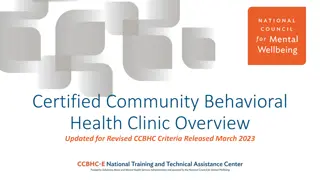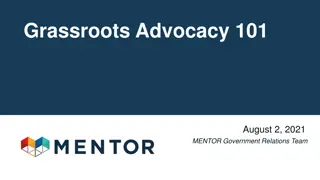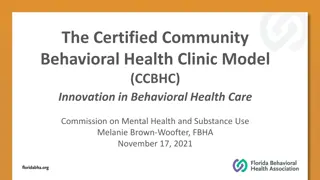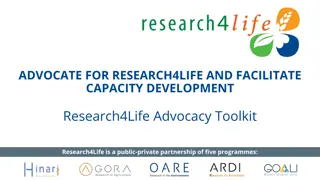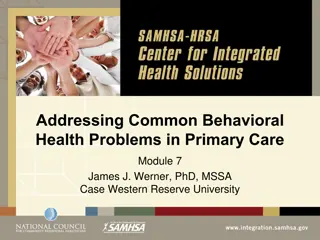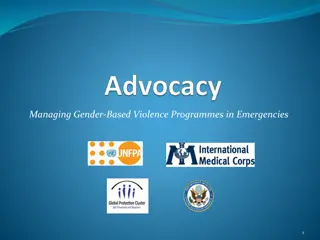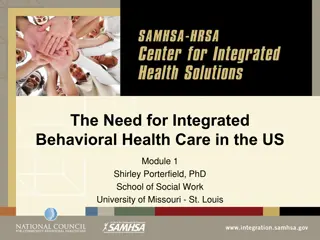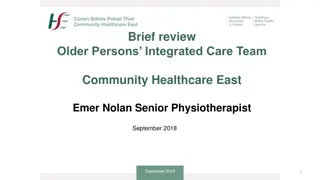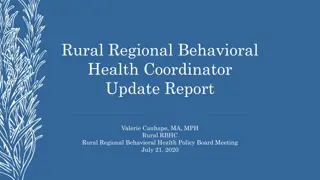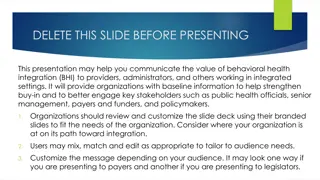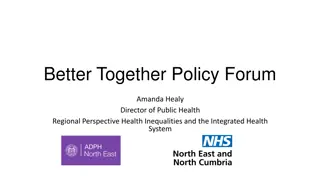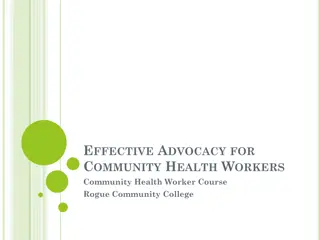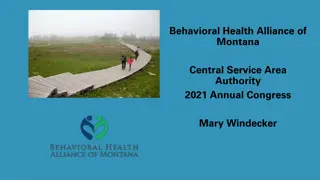Understanding Policy Advocacy and Integrated Behavioral Care
Learn about the role of social workers in policy formation and implementation within integrated behavioral health models. Discover advocacy skills for supporting vulnerable populations in improving their living situations and accessing resources. Understand the differences between advocacy, lobbying, and political activity, and explore the nuances of lobbying and grassroots lobbying in policy advocacy efforts.
Download Presentation

Please find below an Image/Link to download the presentation.
The content on the website is provided AS IS for your information and personal use only. It may not be sold, licensed, or shared on other websites without obtaining consent from the author. Download presentation by click this link. If you encounter any issues during the download, it is possible that the publisher has removed the file from their server.
E N D
Presentation Transcript
Policy Advocacy and Integrated Behavioral Care Module 8 Roseanna McCleary, PhD California State University, Bakersfield
Learning Objectives 1. Develop an understanding of the social worker s role in the formation and implementation of policies within integrated behavioral health models 2. Demonstrate advocacy skills within systems that implement integrated behavioral health programs
Policy Advocacy1 Policy practice is defined as: . . . efforts to change policies in legislative, agency, and community settings by establishing new policies, improving existing ones, or defeating the policy initiatives of other people Policy advocacy is policy practice aimed at helping powerless, vulnerable populations improve their living situations, access to resources, and increase their opportunities Social workers policy practice is considered policy advocacy because we work with vulnerable populations
Advocacy, Lobbying, and Political Activity2 Advocacy and Lobbying are terms that are sometimes used interchangeably, however, they are different Advocacy is a general term that can be simply supporting a cause or speaking up for something you believe in There is no legal definition used for advocacy, however, if an organization uses any funding for advocacy purposes, this must be reported to the IRS Political activity involves campaigning for a particular political party or candidate and is not allowed in 501(c)(3) (nonprofit) organizations
Lobbying2,3,4 Lobbying is a form of policy advocacy, however, it is helpful (for legal reasons) to make a distinction between advocacy, lobbying, and political activity The Center for Lobbying in the Public Interest defines lobbying as: attempts to influence specific legislation through direct or grassroots communications with legislators or their staff Lobbying involves advocacy but advocacy does not always involve lobbying
Lobbying vs. Grassroots Lobbying3 A distinction is also made between lobbying and grassroots lobbying Grassroots lobbying refers to appealing to the general public to contact the legislature about an issue 3 Lobbying ( direct lobbying ) refers to directly contacting government officials or staff to influence legislation Appeals to the public related to a proposition, ballot initiative, or referendum is considered direct lobbying
Why Make a Distinction? It is important to make a distinction due to laws (1976 Lobby Law and 1990 IRS laws) related to direct lobbying The federal government supports nonprofit organizations lobbying and under the 1976 Lobby Law has specified conditions in which lobbying can occur Additional regulations may also be imposed, depending on type, size, and location of an organization
Lobbying Laws5 States, counties, and other local entities such as cities and agencies may have their own employee lobbying regulations California s Fair Political Practices Commission oversees lobbying activities (See http://www.fppc.ca.gov/index.php?id=4 for specific California laws and regulations) Examples of possible differences at the state level: Acceptance of gifts limit on dollar value of gift Ethics training mandatory or not Restrictions on post-employment
Lobbying Myths or Facts?5,6,7 1. You are employed by the State of California and you use your work computer to call your Assembly-person to ask him/her for support of a particular bill that will benefit you and your family your co-workers say this is not lobbying - true or false? 2. Many members of Congress have taken the No Lobbying Pledge that states he/she will not become a lobbyist for 10 years after leaving office true or false? 3. Newt Gingrich s Center for Health Transformation a lobbying organization true or false? 4. Your organization can spend 20% of its budget on lobbying if it makes less than $500,000 true or false?
Systemic Factors that Create the Need for Policy Advocacy Health Care Organization (clinics, hospitals) Policies and Regulations Issues Outside of the Public Sphere (e.g., private insurers, employers) Environmental Factors that Lead to Inadequate Health Care Community Agency Issues Social Context (health disparities, poverty, etc.) Policies and Regulations that Don t Work (Based on B. Jansson, 2011)
Four Basic Skills of a Policy Practitioner1 1. Analytic skills Used to evaluate issues, develop proposals, establish need, identify barriers, and design program evaluations 2. Political skills Need the ability to use power when establishing a political strategy 3. Interactional skills Be able to facilitate, participate in task groups, committees, etc. 4. Value-clarifying skills Ability to use principles to organize practice
Using Policy Practitioner Skills You are a social worker at a multi-site health center that consists of 21 medical clinics, 6 dental clinics, 1 free- standing Women s clinic, 2 mobile clinics, and a health care clinic for homeless persons. Last year, approximately 45,000 persons were served 80% of persons served are Latino (40% monolingual, not English), who primarily work in agricultural settings; 60% have MediCal (Medicaid) and 40% are uninsured or underinsured
Use of Policy Practitioner Skills: Case Study Your health center s vision is to provide access to high quality, culturally sensitive, comprehensive health care to the community, especially those who are underserved. The administration would like to use an integrated behavioral health care model to reach this vision. You, as a social worker, are considered a valuable member of the organization and are asked to be on the committee to realize this vision. Which of the 4 policy practitioner skills would you consider most important for you and your committee at this time? Give reasons, and discuss how and when you might use the other 3 skills.
Policy Practice Challenges 1-48 1. Deciding whether to advocate for a policy Ethics and analysis used to determine if a policy needs advocacy and whether the context will allow an intervention 2. Deciding on where to focus Decision made where to focus change/intervention within the healthcare setting 3. Getting decision makers attention Checking if the context is open enough for an initiative 4. Developing a support base Networks, coalitions, organizations
Policy Practice Challenges 5-88 5. Developing a proposal Solutions developed using policy analysis and put into appropriate format 6. Getting approval for the proposal Goals developed, proposal style chosen, influence resources used, assessment developed 7. Policy-implementing Ensuring that resources are in place for policy implementation 8. Policy-assessing Data gathered about the performance of the policy implementation; program evaluation
Examples of Policy Competencies9 Political Competencies Analytic Competencies Empowering others Using social science research Advocating for the needs of a client Taking a personal position Analyzing the context of policies and issues Designing policy assessments Interactional Competencies Value-clarifying Competency Coalition building Engaging in ethical reasoning Managing conflict Making a presentation
Case Study Challenges and Use of Competencies Going back to your health center s integrated behavioral care committee what challenges do you foresee facing and which competencies would you use to deal with these challenges?
Global Policy Responses10 The World Health Organization concluded that "integrating mental health services into primary care is the most viable way of closing the treatment gap and ensuring that people get the mental health treatment they need." One of WHO s key messages is: Integration is most successful when mental health is incorporated into health policy and legislative frameworks and supported by senior leadership, adequate resources, and ongoing governance.
WHOs 10 Principles for IBHC11 Policy and plans need to incorporate primary care for mental health. Advocacy is required to shift attitudes and behavior. Adequate mental health training of primary care workers is required. Primary care tasks must be limited and doable. Specialist mental health professionals and facilities must be available to support primary care. Patients must have access to essential psychotropic medication in primary care. Integration is a process, not an event. A mental health service coordinator is crucial. Collaboration with other government non-health sectors, nongovernmental organizations, village and community health workers and volunteers is required. Financial and human resources are needed.
Challenges and Opportunities for Policy Advocacy What is your role as a social worker and a policy practitioner (advocate) in shaping, implementing and evaluating policies in our changing healthcare system? Target organizational change Leadership Implementation science your part in this challenge Continuous Quality Improvement at your agency Data and information analysis Health information technology
Do Something! OMH Consensus Statement12 What can you do? Try something different! Instead of just talking, do something, e.g.: Educate the healthcare workforce on the relationship between behavioral and physical health Use community-based, consistent standards to assess quality of programs Make cultural and linguistic proficiency and cultural competence (sensitivity) requirements for licensure, accreditation of healthcare education programs, and certification of healthcare providers
Do Something! Enforce existing civil and human rights law to address discrimination in the health care setting Initiate or improve data collection that shows if healthcare delivery is equitable For low-income healthcare consumers, offer healthcare professionals incentives for providing high quality care Keep reimbursement rates for Medicaid and Medicare equitable with other plans
Do Something! Develop the ability to do same day billing for behavioral and physical health services Create 24/7 access to reduce use of ER for treatment Increase culturally and linguistically appropriate health information, education, and materials that reflect health literacy of the community served Use a life course approach to delivery of services that supports a prevention model of health care
References 1. Jansson, BS. (2010). Becoming an Effective Policy Advocate. Brooks Cole. 2. Michigan Nonprofit Association (2012). Staying legal for Michigan Nonprofits. Retrieved from http://www.stayinglegalmi.org/lobbying_and_political_activity.html. 3. Connecticut Association of Nonprofit Organizations (2003). Advocacy vs. lobbying, coalition building and public engagement. Retrieved from: http://www.ctnonprofits.org/ctnonprofits/sites/default/files/fckeditor/file/policy/resources/AdvocacyVsLobbying.p df. 4. Center for Lobbying in the Public Interest (2012). Retrieved from: http://www.clpi.org/. 5. State of California Fair Political Practices Commission (2012). Retrieved from: http://www.fppc.ca.gov/index.php?id=4. 6. Overby, P. (2011). Gingrich s health care consultancy: Is it lobbying? Retrieved from: http://www.npr.org/2011/12/05/143146399/gingrichs-health-care-consultancy-is-it-lobbying 7. Lessig, L. (2012). The No Lobbying Pledge. Retrieved from: http://www.huffingtonpost.com/lawrence- lessig/the-no-lobbying-pledge_b_1875082.html. 8. Jansson, BS. (2011). Improving healthcare through advocacy: A guide for the health and helping profession. John Wiley & Sons. 9. Jansson, BS. (2010). Becoming an Effective Policy Advocate. Brooks Cole. 10. World Health Organization and World Organization of Family Doctors. (2008). Integrating mental health into primary care: A global perspective. WHO Library Publication. Retrieved from http://www.ibhp.org/uploads/file/WHO-IntegratingMentalHealthIntoPrimaryCare.pdf. 11.World Health Organization and World Organization of Family Doctors. (2008). Integrating mental health into primary care: A global perspective. WHO Library Publication. Retrieved from http://www.ibhp.org/uploads/file/WHO-IntegratingMentalHealthIntoPrimaryCare.pdf. 12. DHHS Office of Minority Health. (2011). Pathways to Integrated Health, Strategies for African American Communities and Organizations, Consensus Statement and Recommendations.







